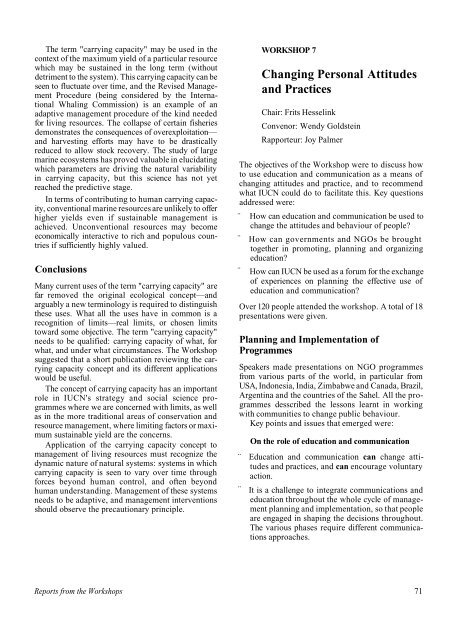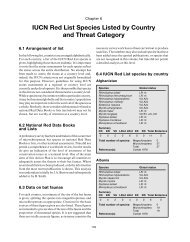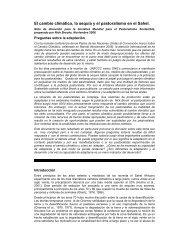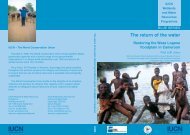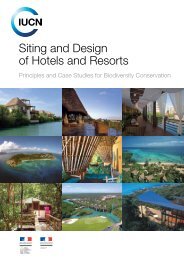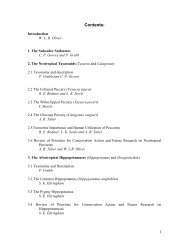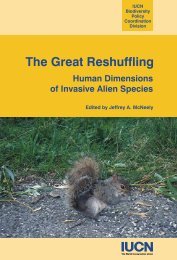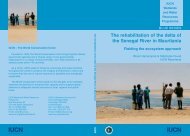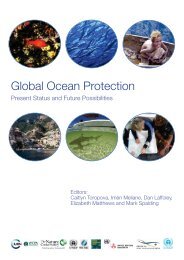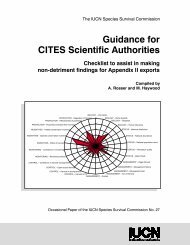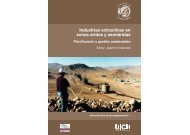Buenos Aires, Argentina - IUCN
Buenos Aires, Argentina - IUCN
Buenos Aires, Argentina - IUCN
You also want an ePaper? Increase the reach of your titles
YUMPU automatically turns print PDFs into web optimized ePapers that Google loves.
The term "carrying capacity" may be used in the<br />
context of the maximum yield of a particular resource<br />
which may be sustained in the long term (without<br />
detriment to the system). This carrying capacity can be<br />
seen to fluctuate over time, and the Revised Management<br />
Procedure (being considered by the International<br />
Whaling Commission) is an example of an<br />
adaptive management procedure of the kind needed<br />
for living resources. The collapse of certain fisheries<br />
demonstrates the consequences of overexploitation—<br />
and harvesting efforts may have to be drastically<br />
reduced to allow stock recovery. The study of large<br />
marine ecosystems has proved valuable in elucidating<br />
which parameters are driving the natural variability<br />
in carrying capacity, but this science has not yet<br />
reached the predictive stage.<br />
In terms of contributing to human carrying capacity,<br />
conventional marine resources are unlikely to offer<br />
higher yields even if sustainable management is<br />
achieved. Unconventional resources may become<br />
economically interactive to rich and populous countries<br />
if sufficiently highly valued.<br />
Conclusions<br />
Many current uses of the term "carrying capacity" are<br />
far removed the original ecological concept—and<br />
arguably a new terminology is required to distinguish<br />
these uses. What all the uses have in common is a<br />
recognition of limits—real limits, or chosen limits<br />
toward some objective. The term "carrying capacity"<br />
needs to be qualified: carrying capacity of what, for<br />
what, and under what circumstances. The Workshop<br />
suggested that a short publication reviewing the carrying<br />
capacity concept and its different applications<br />
would be useful.<br />
The concept of carrying capacity has an important<br />
role in <strong>IUCN</strong>'s strategy and social science programmes<br />
where we are concerned with limits, as well<br />
as in the more traditional areas of conservation and<br />
resource management, where limiting factors or maximum<br />
sustainable yield are the concerns.<br />
Application of the carrying capacity concept to<br />
management of living resources must recognize the<br />
dynamic nature of natural systems: systems in which<br />
carrying capacity is seen to vary over time through<br />
forces beyond human control, and often beyond<br />
human understanding. Management of these systems<br />
needs to be adaptive, and management interventions<br />
should observe the precautionary principle.<br />
WORKSHOP 7<br />
Changing Personal Attitudes<br />
and Practices<br />
Chair: Frits Hesselink<br />
Convenor: Wendy Goldstein<br />
Rapporteur: Joy Palmer<br />
The objectives of the Workshop were to discuss how<br />
to use education and communication as a means of<br />
changing attitudes and practice, and to recommend<br />
what <strong>IUCN</strong> could do to facilitate this. Key questions<br />
addressed were:<br />
¤ How can education and communication be used to<br />
change the attitudes and behaviour of people?<br />
¤ How can governments and NGOs be brought<br />
together in promoting, planning and organizing<br />
education?<br />
¤ How can <strong>IUCN</strong> be used as a forum for the exchange<br />
of experiences on planning the effective use of<br />
education and communication?<br />
Over 120 people attended the workshop. A total of 18<br />
presentations were given.<br />
Planning and Implementation of<br />
Programmes<br />
Speakers made presentations on NGO programmes<br />
from various parts of the world, in particular from<br />
USA, Indonesia, India, Zimbabwe and Canada, Brazil,<br />
<strong>Argentina</strong> and the countries of the Sahel. All the programmes<br />
desscribed the lessons learnt in working<br />
with communities to change public behaviour.<br />
Key points and issues that emerged were:<br />
On the role of education and communication<br />
Education and communication can change attitudes<br />
and practices, and can encourage voluntary<br />
action.<br />
It is a challenge to integrate communications and<br />
education throughout the whole cycle of management<br />
planning and implementation, so that people<br />
are engaged in shaping the decisions throughout.<br />
The various phases require different communications<br />
approaches.<br />
Reports from the Workshops 71<br />
¤<br />
¤


